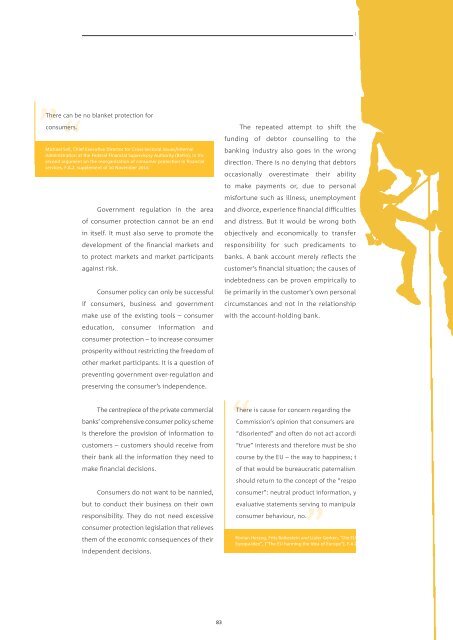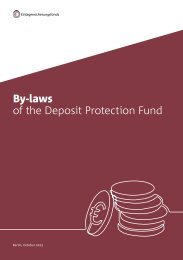Banks and Consumers
The Comprehensive Consumer Policy Scheme of the German Private Commercial Banks
The Comprehensive Consumer Policy Scheme of the German Private Commercial Banks
You also want an ePaper? Increase the reach of your titles
YUMPU automatically turns print PDFs into web optimized ePapers that Google loves.
BANKENVERBAND<br />
There can be no blanket protection for<br />
consumers.<br />
Michael Sell, Chief Executive Director for Cross-Sectoral Issues/Internal<br />
Administration at the Federal Financial Supervisory Authority (BaFin), in his<br />
second argument on the reorganisation of consumer protection in financial<br />
services, F.A.Z. supplement of 10 November 2010.<br />
Government regulation in the area<br />
of consumer protection cannot be an end<br />
in itself. It must also serve to promote the<br />
development of the financial markets <strong>and</strong><br />
to protect markets <strong>and</strong> market participants<br />
against risk.<br />
Consumer policy can only be successful<br />
if consumers, business <strong>and</strong> government<br />
make use of the existing tools – consumer<br />
education, consumer information <strong>and</strong><br />
consumer protection – to increase consumer<br />
prosperity without restricting the freedom of<br />
other market participants. It is a question of<br />
preventing government over-regulation <strong>and</strong><br />
preserving the consumer’s independence.<br />
The repeated attempt to shift the<br />
funding of debtor counselling to the<br />
banking industry also goes in the wrong<br />
direction. There is no denying that debtors<br />
occasionally overestimate their ability<br />
to make payments or, due to personal<br />
misfortune such as illness, unemployment<br />
<strong>and</strong> divorce, experience financial difficulties<br />
<strong>and</strong> distress. But it would be wrong both<br />
objectively <strong>and</strong> economically to transfer<br />
responsibility for such predicaments to<br />
banks. A bank account merely reflects the<br />
customer’s financial situation; the causes of<br />
indebtedness can be proven empirically to<br />
lie primarily in the customer’s own personal<br />
circumstances <strong>and</strong> not in the relationship<br />
with the account-holding bank.<br />
The centrepiece of the private commercial<br />
banks’ comprehensive consumer policy scheme<br />
is therefore the provision of information to<br />
customers – customers should receive from<br />
their bank all the information they need to<br />
make financial decisions.<br />
<strong>Consumers</strong> do not want to be nannied,<br />
but to conduct their business on their own<br />
responsibility. They do not need excessive<br />
consumer protection legislation that relieves<br />
them of the economic consequences of their<br />
independent decisions.<br />
There is cause for concern regarding the<br />
Commission’s opinion that consumers are<br />
“disoriented” <strong>and</strong> often do not act according to their<br />
“true” interests <strong>and</strong> therefore must be shown – of<br />
course by the EU – the way to happiness; the result<br />
of that would be bureaucratic paternalism. The EU<br />
should return to the concept of the “responsible<br />
consumer”: neutral product information, yes;<br />
evaluative statements serving to manipulate certain<br />
consumer behaviour, no.<br />
Roman Herzog, Frits Bolkestein <strong>and</strong> Lüder Gerken, “Die EU schadet der<br />
Europa-Idee”, (“The EU harming the idea of Europe”), F.A.Z., 15 January 2010.<br />
83


















